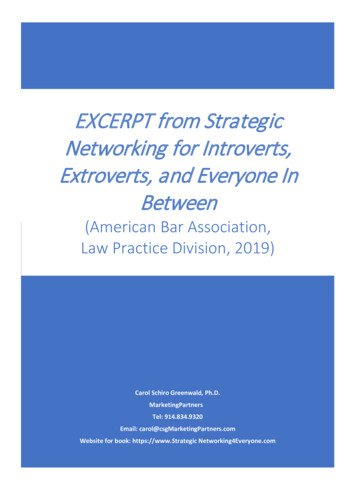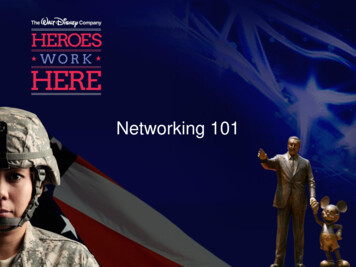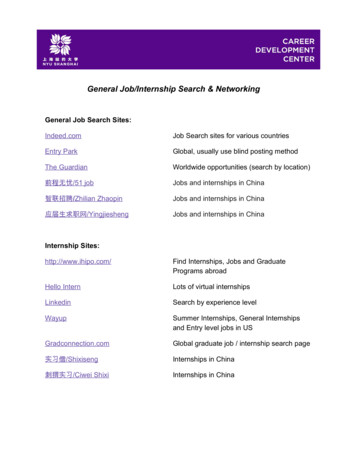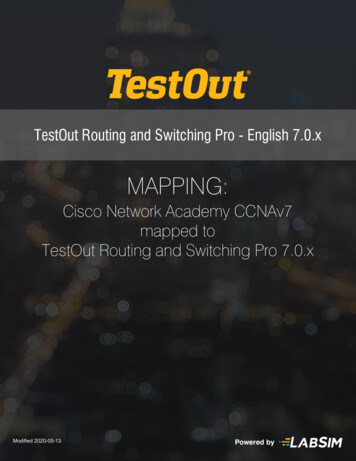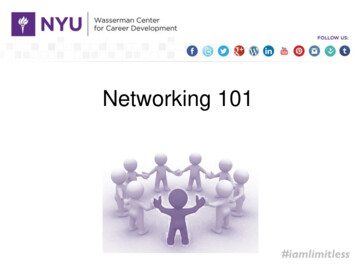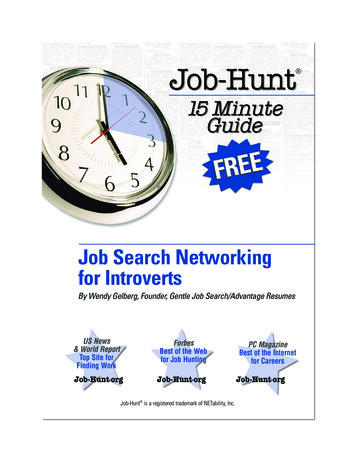
Transcription
Job-Hunt 15 MinuteGuideJob Search Networkingfor IntrovertsBy Wendy Gelberg, Founder, Gentle Job Search/Advantage ResumesUS News& World ReportTop Site forFinding WorkForbesBest of the Webfor Job HuntingJob-Hunt.orgJob-Hunt.orgJob-Hunt is a registered trademark of NETability, Inc.PC MagazineBest of the Internetfor CareersJob-Hunt.org
www.job-hunt.orgJob Search Networking for Introverts"If I have to network in order to get a job, I’ll end up homeless,” exclaimed one woman, only half joking,when she learned from an outplacement firm that about 80% of jobs are found throughnetworking.More than any other job search activity, networking pulls people out of their comfortzone, especially if they’re shy or introverted. You’ve probably heard that it’s essential– not just for job search, but for managing your career – and yet there’s a good chancethat you find the prospect of doing it daunting.But networking doesn’t have to be intimidating or scary. Let’s look at the most commonobjections and learn how to think about them from a different angle. Then we’ll identifysteps that will enable you to network effectively, whether you’re shy, introverted, or justdon’t like to network.Networking: The Old PerspectiveIf you dislike networking, chances are you’ve had one or more of these thoughts.“I’m afraid I’d be imposing; I don’t want to bother people or be a burden.”“How can I call someone I don’t know or I’ve lost touch with? It feels like I’m using people.”“People are too important or too busy to talk to me.”“I can’t stand the superficiality of small talk; can’t stand large gatherings.”“I never know what to say; I’m no good at working the room.”“I can do this on my own. I don’t need help.”“I feel like I’m asking for charity.”“If I don’t come away with a job lead, it’s a waste of my time.”“What if I ask and they say, ‘No’? I’m afraid of being rejected.”Sound familiar? The old perspective views networking as an activity in which you are needy, calling upon othersto help you out of your predicament. This perspective focuses on what you don’t have – a job. From this vantagepoint, you’re missing something, you’re at a disadvantage, and it’s not uncommon for you to feel “less” than thepeople you might want to network with. No wonder it feels so uncomfortable.Or it seems self-serving, because it focuses on what you stand to gain. Relationships are lopsided when onlyone party benefits. Again, that’s uncomfortable.Additionally, if you’re shy or an introvert, the very prospect of interacting with people will challenge your confidence (if you’re shy) or tax your energy reserves (if you’re an introvert).It doesn’t have to be this way. 2009, NETability, Inc. All rights reserved. Not for commercial use without prior approval.
www.job-hunt.orgJob Search Networking for IntrovertsNetworking: A New PerspectiveNetworking at its most basic is simply developing relationshipsand sharing information and resources for mutual benefit. Youdo that all the time outside of the context of job search andcareer – you ask for the name of a good mechanic, give advice ongardening, alert friends to a new book or movie or restaurant thatyou know will interest them, and so on. When you need the nameof a mechanic, you don’t see yourself as flawed or at fault or inany way inferior for not having someone to fix your car. Likewise,you aren’t flawed or at fault or inferior if you happen to need ajob. When you offer advice or information to friends and family, they appreciate the information and thoughtfulness. Likewise, when you share your professional expertise, you position yourself as someone who has knowledge or resources that might be valuable to someone else. That’s the new perspective – you as a resourceto others – that is most helpful when networking.The new perspective focuses on what you do have – a proven, well-established skill set. Or if you’re just starting your career or changing fields, you bring potential, a circle of contacts, knowledge in other areas, and (withresearch and/or training in your field of pursuit) intelligent and challenging questions. Trying to conduct a jobsearch independently, with no help from others, is inefficient. People do business with, and hire, peoplethey know and trust. Networking allows you to establish relationships and build trust.Make your primary goal to build relationships and help others achieve their goals. Your need for a job, in thecontext of networking, will be secondary much of the time. Engage with others wearing your professional hat,not your job seeker hat. If you approach networking from the perspective that you bring valuable knowledge tothe conversation, then you’re certainly not imposing or bothering others and they’re not likely to say no. If you’rehelping others reach their goals, they won’t be too busy to talk to you or feel like you’re using them. Networkingis a lot like planting seeds – you don’t know which ones will take root and grow. You don’t have to come awaywith a job lead today – conversation may bear fruit in the future.In addition, when you focus on the needs of others, you become less self-conscious, which reduces shyness.And, if you’re an introvert, as you probe and listen to understand what those needs are and try to generate solutions, you get to exercise your introverted strengths. If you think of networking in terms of cultivating connections, developing long-term, ongoing relationships, the process will feel less superficial and more genuine. 2009, NETability, Inc. All rights reserved. Not for commercial use without prior approval.
www.job-hunt.orgJob Search Networking for IntrovertsSerendipity vs. IntentionNetworking contains a fundamental paradox – sometimes you achieve wonderful outcomes entirely by chance.Sometimes you achieve the desired results (or different yet valuable results) through deliberate actions. Andsometimes, despite the most carefully orchestrated plans, you don’t get the outcome you hoped for. The processis often nonlinear and indirect. It can be most effective if you stay open to the possibilities.The following specific tips will enable you to maximize your networking experiences. These tips are designedto reduce the shy, self-conscious feelings that networking can produce in almost everyone, and to enable thosewho are introverts to manage their energy and identify/capitalize on their introverted strengths.Where & How: Large Group EventsIntroverts don’t typically enjoy group events, because they are a huge energy drain, but sometimes they are necessary and unavoidable. By definition, since you’re mingling with people, you will be networking in one form oranother because you will be exchanging information. You will also be visible, and your presence will be noted.Even events that are not career-related can benefit yourcareer, although you may not always be able to predict ordetermine precisely how. If you do attend any of these kindsof events, be open to the possibilities. Sometimes simplyengaging in an activity with others who share your interestis enough of a connection to begin to build the personal trustthat is the foundation of networking.The goal of attending these events is to begin to form relationships, not to collect business cards from everyoneelse who attends the event. If, as an introvert, you dislike small talk or the superficial conversations that aretypical in large gatherings, keep in mind that networking at large group events can pave the way for amore in-depth one-on-one conversation.Examples of large group events you can attend or participate in include Formal job seeker networking events (see the Job Search Networking Resources at www.job-hunt.org/) Alumni reunions Professional association meetings or conferences Holiday parties, family/neighborhood gatherings Workshops/seminars Political, community, or religious activities Hobbies, sports, clubs, recreational events (find others who share your interests at www.meetup.com) Volunteer activities 2009, NETability, Inc. All rights reserved. Not for commercial use without prior approval.
www.job-hunt.orgJob Search Networking for IntrovertsThe following 15 pointers will help you navigate these events more successfully.1. Find out in advance, if possible, who else will be there. You can deliberately seek out people you’re most interested in talking with. Consider contacting them ahead of time to arrange to connect in person while you’rethere. This strategy is useful for everyone, but it especially allows introverts to use their time most efficiently.2. If you’re uncomfortable approaching someone directly, ask the host or organizer to make introductions.3. Volunteer to participate on the welcoming committee – having a specific function makes it easier to talk topeople and gives you a purpose as you attend to the needs of other guests.4. Prepare general conversation starters and questions so you don’t have to come up with ideas off the cuff.5. Prepare (and practice) your own brief introduction (this will vary depending on the kind of event you’re attending and the reason you’re there, e.g., what you say at a relative’s wedding will be different from whatyou’ll say at a professional conference).6. Bring business cards.7. Arrive early before crowds have arrived – this helps introverts manage energydrain and helps people who are shy find others to talk with before little groupsBring my company name.combusin plenty ofess cards!my adcity, zi dressp codehave formed.8. Bring a friend – knowing there’s someone in the room who will always be happyPhone: 000-0Fax00-0email : 000-000-0 0000: abc@def.co 00mto include you in a conversation can take the pressure off. If the friend is more of an extrovert,he or she may help make introductions for you.9. Listen. Introverts usually have good listening skills – use them to engage others in conversation and identifytheir needs. Apply small talk as a means to initiate the conversation in the first place and open the door toa deeper discussion, which may occur at a later date. Remember that you can make as much of a favorableimpression by giving others the spotlight as you can be being a scintillating conversationalist.10. Don’t try to talk to everyone there – instead, set a goal, some number of people that you think you can reasonably talk with, and consider the event successful if you meet that goal.11. Take breaks to recharge your batteries, if you need to.12. Seek out others who are on the fringe, looking in. They may be shy or introverted and will often welcomehaving you take the initiative.13. Disengage by sincerely telling the other person you enjoyed your conversation and asking for his or her card,and perhaps suggesting a follow-up conversation or simply encouraging the other person to call on you ifyou can be a resource in any way.14. Leave early if your energy lags.15. Follow up. Send an email or call the people you met and acknowledge the conversation you had, and perhaps send information or suggest resources in follow-up to what you learned about their needs or goals. Youcan also suggest an in-depth conversation over coffee or lunch. 2009, NETability, Inc. All rights reserved. Not for commercial use without prior approval.
www.job-hunt.orgJob Search Networking for IntrovertsWhere & How: One-On-OneThe introvert typically prefers one-on-one contacts tolarge groups, and there are infinite possibilities for thesekinds of meetings. They can occur as planned sessionswith a specific agenda or they may be chance encountersand casual conversations. Even if you’re not an introvert,it helps to prepare for the planned conversations so thatyou stay focused and on topic.As noted above, most conversations will not hinge on thedirect question, “Do you know of any jobs that might besuitable for me?” Rather, these conversations will be information exchanges. What might you exchange information about? If you’re talking with someone in the same fieldthat you’re in, you might initiate a discussion to share information, articles, or links on new trends in the industry.If you already know the person, you might just want to “catch up” and exchange information casually. Bringpeople up to date on what you’re doing to stay current and active in your field. By doing so, you remind them ofyour value as a resource, and they remember the kinds of problems you solve and immediately start to think ofappropriate situations for you, even without your asking.In some cases, you may encounter or be referred to someone who may be able to be a resource for you,whether you’re transitioning within the same field or making a career change. In these situations, the otherperson may be able to Provide the name of somebody to talk to in the industry or in a particular company Offer resume feedback Provide answers to questions in your (or their) area of expertise Identify/suggest job titles in a new field; offer advice on transferring from a former career into a new careeryou’re exploring Pass a resume along to a hiring manager Provide specific company information Explain “how did you get started in your field?”In these conversations, you are hoping for a specific outcome, but it helps to be prepared to go in unexpecteddirections. Basically, you are gathering information, in the hope that you will uncover a particular nugget thatwill have special value. 2009, NETability, Inc. All rights reserved. Not for commercial use without prior approval.
www.job-hunt.orgJob Search Networking for IntrovertsThe following 12 tips will help you navigate these conversations more successfully.1. Respect the preferences of the other person in terms of talking face-to-face, by phone, or by email. If youhave a choice and you’re an introvert, email can give you a chance to think about what you want to say andorganize your thoughts before having to express them.2. Ask a referral to pave the way. If someone refers you to another person, find out why they believe thatperson can be valuable for you to talk with. Ask them to call ahead to find out if that person prefers to becontacted by phone or email. That smoothes the way and reassures you that the person is receptive to beingcontacted.3. Limit the number of calls per day. If you’re calling people to schedule informational interviews, set goals thatare within reach for you – perhaps making only two or three calls is reasonable for you in one day. If you’rean introvert, you need to allow time to recharge.4. Just do it. If you’re anticipating a conversation that makes you uncomfortable, acknowledge your discomfortto yourself but do it anyway. Bribery works.5. Initiate conversations at your peak time. Some people prefer to make difficult phone calls first thing, to getthem out of the way. Others find it easier to make one or two inconsequential calls (e.g., scheduling a haircut) first to get their thoughts flowing. Figure out what works for you and go with that.6. Develop a practice script to initiate the conversation (not to actually read, but to keep you focused).7. Practice. The more of these conversations you have, the easier they become. You may even try out your scripton a friend or colleague.8. Set an agenda for the actual conversation. If you begin with a focus and a purpose, you increase the likelihood that you will get the kind of information you want.9. Manage the time. Your agenda will help keep you from overstaying your welcome.10. Listen. Even as you gather information that is useful in your job search, you are uncoveringthe interests and needs of the other person.11. Follow-Up. Ask to touch base as you go forward and implement their advice orcontact their referrals. That will make it easier to stay connected,moving forward.12. Send thanks. A thank you note is always appropriate, or anarticle or item that relates to an interest you’ve uncovered.Maintain the relationships once you’ve established them – shareinformation, bounce ideas around, keep up to date on their careerprogression and personal lives. A regular update keeps you onfo rsknT h au r ti m e!yopeople’s radar screen, reminds them of your value as a resource,and makes it easier for you to contact them when you need to in the future. 2009, NETability, Inc. All rights reserved. Not for commercial use without prior approval.
www.job-hunt.orgJob Search Networking for IntrovertsWhere & How: Social NetworkingTo the delight of many who are introverted or shy, there are many opportunities online to develop relationships thatcan be beneficial professionally. Social networking sites such as LinkedIn, Facebook, and Twitter originated to enablepeople to build and maintain relationships online. Sites such as these can balance the scales for introverts – instead ofhaving to think on your feet or experience energy drain, you can participate when you your energy is high and then takethe time to analyze ideas or allow your thoughts to crystallize before sharing them with others.LinkedIn is becoming a necessity in the job search and career management world, as recruitersand employers are increasingly searching member profiles (rather than going to job boards) tofind candidates that match their requirements. At its most basic, LinkedIn enables you to build a network of contacts(called 1st degree contacts), to connect with your contacts’ contacts (2nd degree contacts), and ultimately with yourcontacts’ contacts’ contacts (3rd degree contacts), all for free. If you’re connected to 100 people, and each of them isconnected to 100 people, your second degree contacts will number 10,000. If each of those people is likewise connected to 100 people, you will have access to 1 million people. Your connections can introduce you to their connections, and you can gain access to an incredible number of people and companies. LinkedIn has changed the dynamicsof the networking and job search process. For introverts, LinkedIn enables you to stay connected to and visible to alot of people with a minimal expenditure of energy and without any direct conversation.Facebook, more widely used, is seen by many as more of a social networking site than a professional networking site, but, like LinkedIn, it offers you the opportunity to reconnect with a lot ofpeople from many arenas in your life and connecting is the foundation of all networking. If you use Facebook, justremember that what you post is public and can be viewed by present and prospective employers.Twitter, known as a microblogging site, is growing in popularity and is another site that lets youconnect with all kinds of people. It resembles a large, in-person networking event in that you havethe opportunity to make an initial connection with people that you might not have had access to otherwise, and havethat relationship grow. You can establish your professional brand, connect with job seekers, those who give careeradvice, companies, and others who share professional or personal interests.All of these sites offer professional visibility and opportunities to forge connections, with the time to process and reflect before responding (a real plus for introverts). Likewise, you can seek out affinity networks to find other opportunities to form professional connections. As noted before, employers visit these sites to look for promising candidates,so keep your posts appropriate and professional.Whether you choose to network in person or online, in groups or individually, there are countless opportunities to buildrelationships with other people. These relationships are essential in both job search and career management, becausepeople hire, and do business with, people they know and trust. Your networking challenge is to become the known andtrusted candidate with the skills and background to solve an employer’s problems. Position yourself as a resource forothers, help them achieve their goals, and you will become a successful networker. 2009, NETability, Inc. All rights reserved. Not for commercial use without prior approval.
www.job-hunt.orgJob Search Networking for IntrovertsAbout WendyWendy Gelberg is the founder of Gentle Job Search/Advantage Resumes(www.gentlejobsearch.com) and author of The Successful Introvert: How to Enhance Your JobSearch and Advance Your Career (www.happyabout.info/thesuccessfulintrovert.php). She isa certified career coach and resume writer whose expertise is in helping people who are uncomfortable “tooting their own horn.” Wendy gives workshops, coaches individuals, providesoutplacement services, and writes articles and blogs on all aspects of the job search process.Wendy has been a career coach/advisor and resume writer for more than 12 years. Her passion is teaching,both in group settings and one-on-one, and she loves facilitating those “aha” moments when people discoverinformation that is meaningful and helpful to them. She has worked with thousands of clients to develop strategies that are effective and do-able for introverts and extroverts alike.Contact Information:You can follow Wendy on Twitter at @wendygelberg (twitter.com/wendygelberg), and e-mail her atwendy@gentlejobsearch.com.About Job-HuntJob-Hunt.org is a free “employment portal” Website which links to over 13,000 employers and job search andcareer resources. Advice from various job search experts is also provided, from protecting your privacy to usingCraigslist, LinkedIn, and Twitter in your job search.Wendy Gelberg is Job-Hunt’s Job Search for Introverts Expert offering advice every month to help introverts andshy people job hunt successfully.Assisting job seekers since 1995, Job-Hunt has won much recognition for the quality of the content, and ourgoal is to continue to deserve that recognition. US News & World Report Top Site for Finding Work Forbes Best of the Web for Job Hunting PC Magazine Best of the Internet for CareersContact Information:Email: sjoyce@job-hunt.org Twitter: Twitter.com/JobHuntOrg Office: 508-624-6261 2009, NETability, Inc. All rights reserved. Not for commercial use without prior approval.
they know and trust. Networking allows you to establish relationships and build trust. Make your primary goal to build relationships and help others achieve their goals. Your need for a job, in the context of networking, will be secondary much of the time. Engage with others wearing your professional hat, not your job seeker hat.
